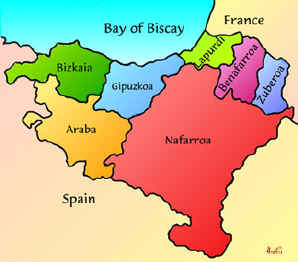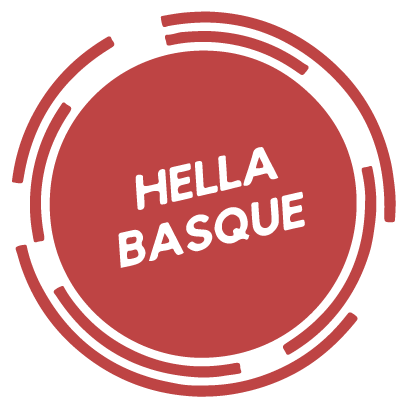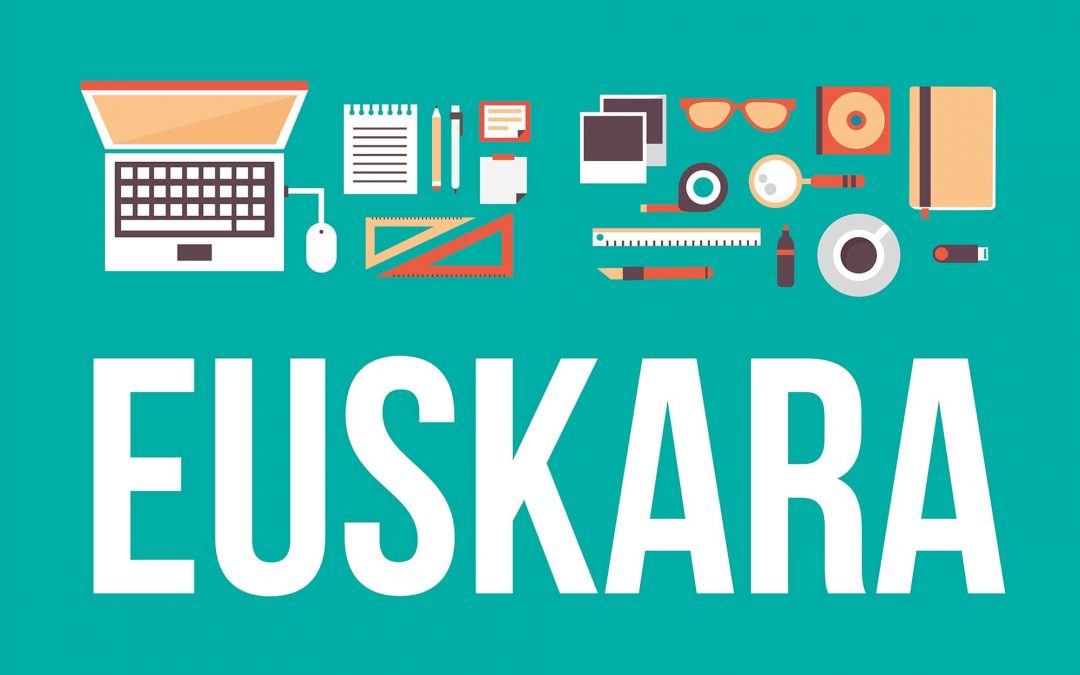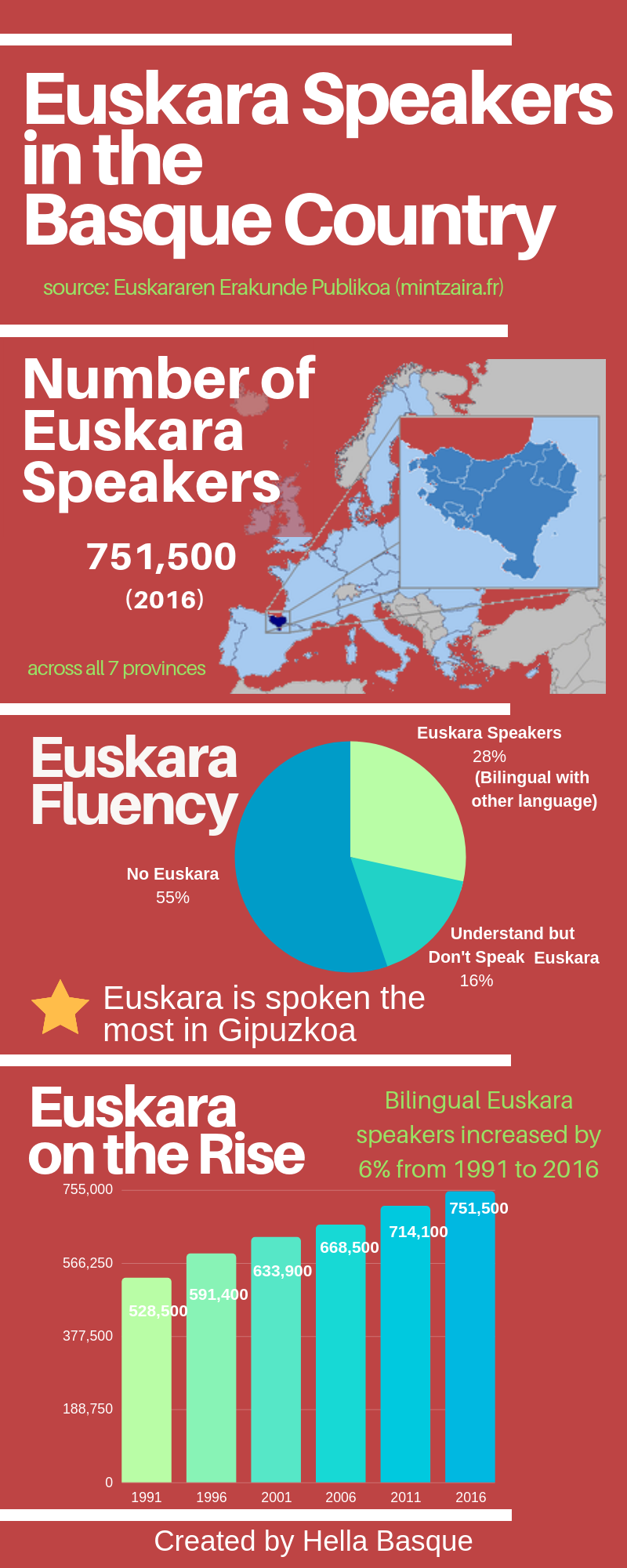This post contains affiliate links, meaning if you click through and make a purchase, I may earn a commission at no additional cost to you.
Euskara, the Basque language, is often described as mysterious. While a lot about the language is still unknown, there are a few facts linguists can agree upon.
Today I’m listing them out for you.
Feel free to share with anyone you know who is curious about Basque.
1. Euskara Is a Language Isolate
The Basque language is unrelated to any other language in the world. As far as linguists are concerned, its origins really are a bit of a mystery.
While certain aspects of Euskara have similarities with other non-Indo-European languages, no definitive connection has been made between Euskara and any other language in the world.
As such, I have to write in bold that Euskara is not like French or Spanish.
Because the Basque Country sits in both France and Spain and many Basques are at minimum bilingual, people often think Euskara must be a dialect of French or Spanish, or some sort of related Romance language. It is not!
Euskara is oddly unrelated to French and Spanish, although it borrows some words from these languages.
After all, they are linguistic neighbors. Just not linguistic relatives.
2. Euskara Is Pre-Indo-European
The Basques were speaking Euskara long before the Indo-European-speaking people arrived in Europe. Most languages in Europe are Indo-European and thought to have originated 12,000 years ago.
That means Euskara is at least more than 12,000 years old!
Linguists still haven’t pinpointed its origins and how old the language actually is, but we know Euskara at the very least pre-dates the Romans.
Euskara is the only pre-Indo-European language in western Europe.
It’s safe to say then that Euskara is one of the oldest surviving languages in Europe, if not the world.
3. There is a Standardized Form of Basque Called Euskara Batua
Euskara has many different dialects that can be quite distinct from one another. In order to unite Basque speakers by helping them understand one another and to help facilitate the formal teaching of Euskara, a unified form of the language was invented by academics in the 1960’s.
Euskara Batua is heavily based on the Gipuzkoan dialect, as that is the most central dialect and deemed the easiest to understand by people from all corners of the Basque Country.
Now Euskara is taught in schools, and it is this standardized form of Euskara that is instructed.
Informally, dialects of Euskara are picked up by children in families and local communities, but if you’re going to learn Euskara from a formal curriculum, it will be Euskara Batua. This forms a distinction between euskaldun zaharra (native Basque speaker) and euskaldun berri (new Basque speaker).
I’ve heard it can be much easier for euskaldun zaharra to understand new Euskara speakers than the other way around. But with practice and a trained ear, I’ve been told it’s very possible for euskaldun berri to pick up dialects of Euskara.
4. Euskara Did Not Have a Standard Orthography Until the 1960’s
For such an ancient language, I find it interesting that there was no standardized way of spelling Basque words until Euskaltzaindia, the Academy of the Basque Language, created Euskara Batua.
Before the official Basque alphabet was established and standardized spellings were invented, Euskara was often spelled phonetically like French and Spanish.
This is just a fun fact for me, because I like to remember this when I see Euskara speakers getting upset about people having “non-Basque” spellings of their last names. The spellings they take for granted as the “right” Basque are really only a few decades old!
5. Euskara Is a Co-Official Language in Some Parts of the Basque Country
 The Basque Autonomous Community and parts of Navarre give Euskara co-official language status with Spanish. This means that Basque speakers can conduct official business in government institutions in Euskara if they so choose.
The Basque Autonomous Community and parts of Navarre give Euskara co-official language status with Spanish. This means that Basque speakers can conduct official business in government institutions in Euskara if they so choose.
On the other side of the border in France, however, Euskara is not given any sort of official status. French is the only official language in France, so Basque speakers must use French in all formal settings where the government is concerned.
I’m still in the early stages of learning Euskara, so I lack the understanding needed to explain the nitty gritty of what makes the language unique in terms of grammar, phonology, and syntax. But if you’re interested in those details, I’d recommend you read Britannica’s page on Euskara.
Want to know how many people in the Basque Country speak Euskara? I put together this infographic based on a 2016 study.
Looking to learn Euskara? Check out this list of online resources to help you get started.
I hope you enjoyed this article on Euskara! Feel like this list is missing something? Share your two cents in the comments.
CONTINUE READING:
- All About Basque Blood Types (VIDEO)
- Tips for Researching Your Basque Genealogy
- The Ultimate List of Basque Restaurants in the United States (2019)



Kaixo! After reading your article I would like to leave you some feedback concerning the age of Euskara. This article makes a risky assumption when it comes to argue that Basque is 12.000 years old, based on the fact that it is pre-Indo-European, but quite more has to be detailed here.
We know that Basque is a pre-Indo-European language because has been the only one surviving their huge influence. However, the Indo-European language mass started to spread from the actual west Russian area 6.000 years ago to the area that is covering now.
This proves Basque is at least 6000 years old, but there is no way of arguing it has 12.000 years, because the first physical evidence in Basque is from the 1st century, and we do not even know if the humans occupying caves 12.000 years ago in the Pyrenean area had a developed oral language. So it is still impossible to guess if any of the possible existing languages back in that time were related to Basque or to any other.
Hey, thanks for your comment! I appreciate this additional information <3
The dictionary by White & Aulestia is well out of date and not very good for learners.
Try the Morris Student Plus published by Harluxet.
I am a native English speaker and Euskaldun berria living in Nafarroa and I used the Morris dictionary.